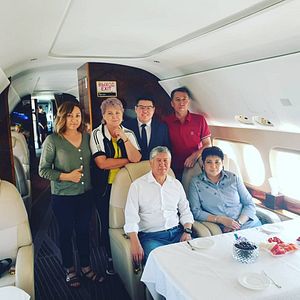After thrice refusing to obey subpoenas from the Kyrgyz Interior Ministry, former President Almaztbek Atambayev has reportedly left the country on a private Russian jet. Atambayev’s departure comes as tensions between the former president and his successor, Sooronbay Jeenbekov, reach new hights.
On July 24, Atambayev left Kyrgyzstan via the Russian military base at Kant aboard a private jet operated by RusJet. A spokesperson for the Social Democratic Party (SDPK), Kunduz Joldubaeva, announced via Facebook that Atmbayev and a small delegation were en route to Russia on a plane sent by an unnamed “inviting party.” The delegation aboard the plane included SDPK Chair Asel Koduranova, two other members of parliament, Muradil Mademinov and Irina Karamushkina, and Temirlan Sultanbekov, whom Akipress identified as the SDPK representative in Russia.
Atambayev earlier said his upcoming visit to Russia — for meetings “at the highest level” — would be brief. He expects to return on July 25.
The Interior Ministry has sought to bring Atambayev in “as a witness” for questioning in a criminal probe related to the 2013 release of notorious crime boss Aziz Batukayev. Atambayev, who served as president from 2011 to 2017, is also facing a bevy of charges beyond the matter of the unlawful release of Batukayev, including corruption, lobbying on behalf of a Chinese company involved in the ill-fated modernization of the Bishkek Power Plant, involvement in supplying coal to the plant, and illegal receipt of a plot of land in Koi-Tash.
Atambayev denies the allegations against him and has also labeled as illegal moves by the parliament to strip him of ex-presidential immunity.
Refusing two subpoenas, under Kyrgyz law, technically opened Atambayev to forcible detention for questioning. But as the issuing of a third subpoena and the July 22 visit by Deputy Interior Minister Mirlan Kanimetov to seek an in-person explanation for why Atambayev was refusing to obey demonstrate, the Kyrgyz state is proceeding carefully.
Atambayev remains largely defiant, defending his innocence and arguing that the state’s pressure is politically motivated.
The potential paths forward are few and contain significant risks, not to mention areas of unpredictability. On one path, Atambayev returns to Kyrgyzstan and remains defiant, possibly pushing the state to move to detain him by force. Such a series of events could quickly spin out of hand, though in ways that are distinctly different from previous iterations of political unrest.
Alternatively, Atambayev could remain in Russia. Both former Presidents Askar Akayev and Kumanbek Bakiyev fled Kyrgyzstan, with Akayev now in Russia and Bakiyev in Belarus. A significant difference in Atambayev’s case is that both Akayev and Bakiyev were sitting presidents forced out by public protests. They resigned and fled the country (or fled and resigned). Atambayev’s position is weaker and the circumstances markedly different. As a former president, Atambayev doesn’t have the same state resources Akayev and Bakiyev wielded.
Atambayev, though, is not without supporters. Over the last few weeks, hundreds have gathered at his compound in Koi-Tash, a village south of Bishkek. They set up yurts, a signal of an intent to stick around. As RFE/RL has reported, Atambayev publicly stated that there are weapons at the compound. And, as Eurasianet reported, when Atambayev drove to Kant — 15 miles east of Bishkek — he was accompanied by “a phalanx of around 200 supporters” to ward off possible arrest, or just to show support.
It is remarkable that the Kyrgyz government allowed a person who is open defiance of three subpoenas, and accused of various crimes, to leave the country. Russia has also tipped its hand in allowing Atambayev to leave via its military base and it will be interesting to discover exactly whose plane Atambayev was whisked away in. Whom Atambayev meets in Moscow and whether he returns will be pivotal in the next phase of the great Atambayev-Jeenbekov rift.

































